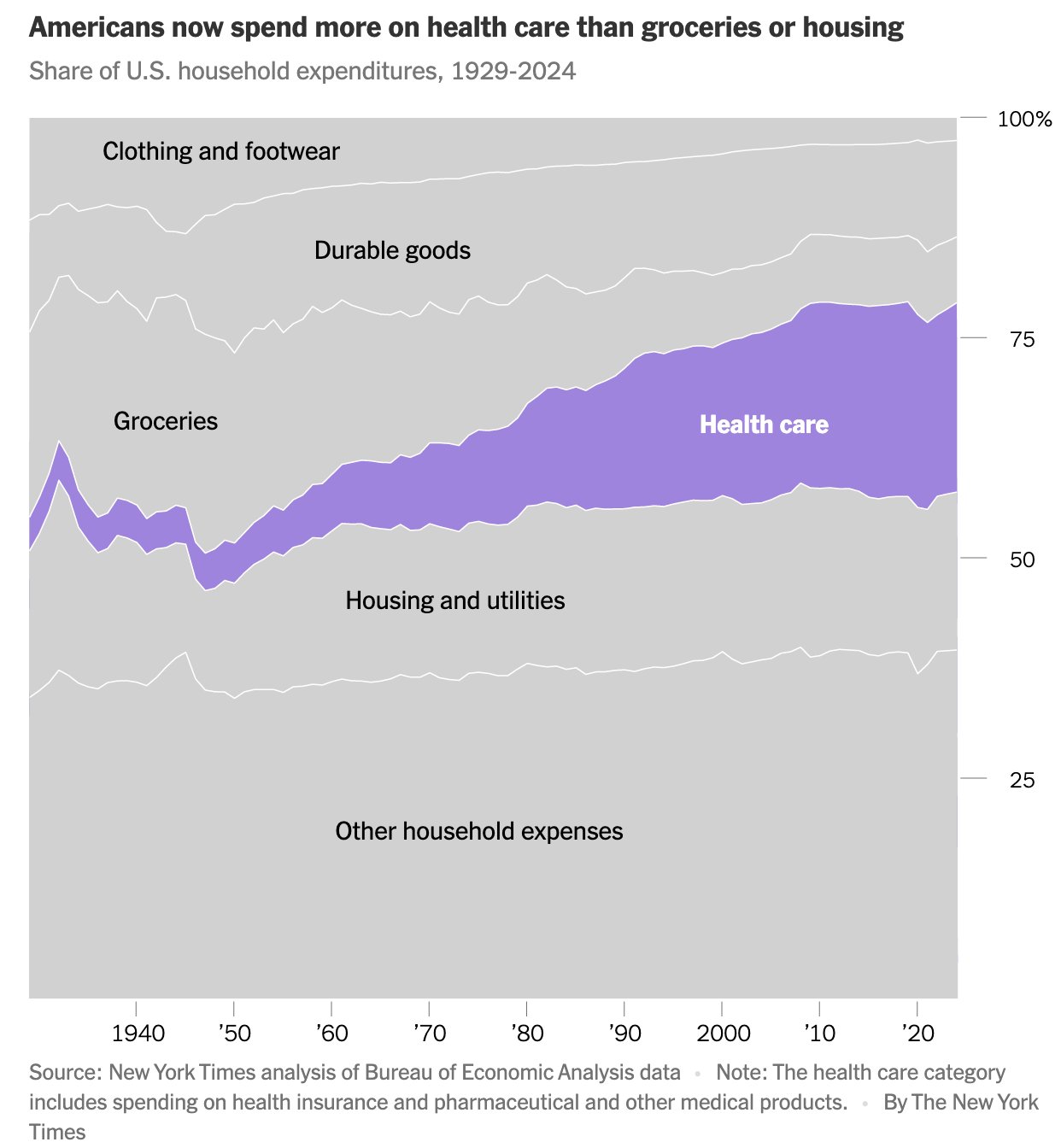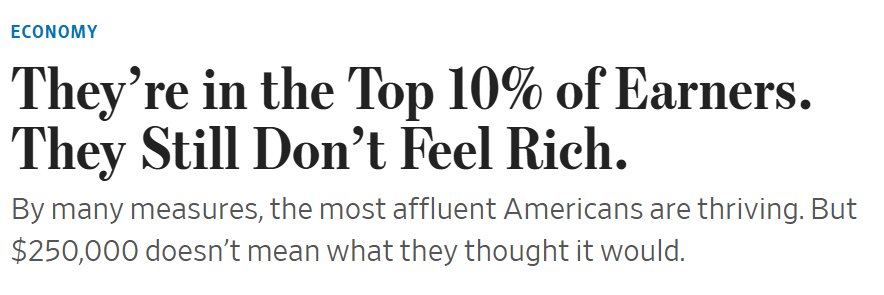One of many greatest monetary developments this century is the rising price of dwelling in lots of requirements. That development has been supercharged within the 2020s.
The price of autos.
The price of auto insurance coverage.
The price of housing.
The price of medical insurance.
It’s all getting increasingly more costly.
This chart from The New York Occasions reveals the modifications within the proportion of various spending classes over the previous 96 years:

The excellent news is that spending on requirements equivalent to meals and clothes/sneakers has dropped significantly over time as a proportion of family budgets. The dangerous information is that healthcare prices have utterly eaten up all of these relative good points.
Whereas incomes have risen within the 2020s together with a booming inventory market, many Individuals have a legit gripe concerning the rising price of dwelling on this nation. Healthcare, housing and vehicles are all much more costly now and it will probably create a pressure on family budgets.
One group that doesn’t have as a lot of a gripe is these on the high of the earnings spectrum. The issue is that lots of them don’t really feel all that safe regardless of experiencing the largest good points in current many years.
The Wall Avenue Journal had a bit this week about folks within the high 10% by earnings who don’t really feel wealthy:
Right here’s an instance from the story:
Lauren Fichter and her husband earn about $350,000 a 12 months. The couple personal their Studying, Pa., dwelling and a trip property they lease out on Airbnb. Their three kids play membership sports activities, and the household usually grabs takeout after video games.
However when her son Dalton heads to school subsequent 12 months, he’ll should faucet scholar loans and hunt for scholarships. The couple haven’t been capable of save sufficient to cowl all of their kids’s anticipated faculty bills, which frequently price round $75,000 a 12 months per scholar for households at their earnings degree.
“After I was youthful, I wouldn’t even fathom making this a lot cash,” stated Fichter, 47. However at the moment, “I really feel like we’re simply the conventional, run-of-the-mill, middle-class household.”
It’s not essentially that they really feel poor — they only don’t really feel wealthy.1 They’re not alone:
Greater than 1 / 4 of individuals whose households earn between $200,000 and $300,000 a 12 months report that they’re both “not very happy” or “under no circumstances happy” with their monetary state of affairs, he stated.
This looks as if insanity however I utterly perceive how folks making this kind of earnings may really feel this manner.
As you earn more money your life-style modifications. You spend extra money. Luxuries turn out to be requirements. You start hanging out with individuals who make much more cash than you do and attempt to sustain with them. Your expectations get inflated, the goalposts hold transferring and the entire sudden $350k doesn’t go almost so far as you thought it might.
It’s a story as outdated as cash.
This group has additionally skilled inflation in asset costs:

The highest 20% by earnings holds 71% of the wealth on this nation.2 That’s up from 60% in 1989. The Journal notes that the inflation-adjusted incomes of the highest 5% rose greater than 100% from 1983 to 2019. Individuals on the excessive finish don’t really feel inflation as a lot as the remainder of the earnings inhabitants.
Clearly, folks transfer out and in of various earnings brackets over time. There’s extra motion in these brackets than you assume. I wrote this in Don’t Fall For It:
Analysis reveals over 50% of Individuals will discover themselves within the high 10% of earners for no less than one 12 months of their lives. Greater than 11% will discover themselves within the high 1% of income-earners in some unspecified time in the future. And near 99% of those that make it into the highest 1% of earners will discover themselves on the surface wanting in inside a decade.
There are additionally many various definitions of wealthy. Simply since you make so much doesn’t imply you retain so much. A six-figure earnings goes additional in some areas than others. Wealth isn’t the identical factor as earnings or spending. Wealth is what you don’t spend.
Wherever you fall on the earnings or wealth spectrum, that is one monetary drawback that can by no means go away. It might probably’t — it’s human nature.
Within the social media info age, that is solely going to worsen.
Michael and I mentioned healthcare inflation, the highest 10%, wealthy individuals who don’t really feel wealthy and extra on this week’s Animal Spirits video:
Subscribe to The Compound so that you by no means miss an episode.
Additional Studying:
The High 10%
Now right here’s what I’ve been studying these days:
Books:
1Ben’s wealthy rule of thumb: For those who personal multiple home, you’re most likely wealthy.
2The highest 1% by earnings is near 24% of the whole, up from round 16% in 1989.


